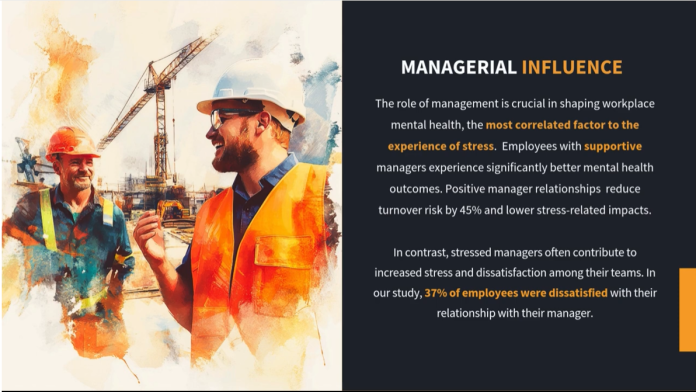CaDCR staff writer
Construction Safety Nova Scotia (CSNS) has released new data highlighting significant mental health challenges in the province’s construction sector. The findings come from the first Nova Scotia-specific study of its kind, conducted in partnership with research firm WorkInsights and based on responses from 1,171 construction workers.
The survey, conducted in spring 2024, confirms that high stress is a key factor behind many of the industry’s most pressing issues — including workplace safety, turnover, and substance use.
More than 36 per cent of respondents reported experiencing high or very high levels of stress. Those working in high-stress environments were up to 60 per cent more likely to be involved in workplace incidents, and 40 per cent of workers said they were considering leaving the industry due to stress-related concerns.
“This report confirms what we have been hearing anecdotally,” said MJ MacDonald, CEO of Construction Safety Nova Scotia. “Now, we can clearly see how our workers are doing and, more importantly, how to help them. This report provides a concrete roadmap for change.”
Other key findings include:
- Manager relationships are critical: One-third of workplace stress is tied directly to interactions with managers. While 37 per cent of workers reported dissatisfaction with their managers, strong relationships were linked to a 45 per cent reduction in turnover risk.
- Substance use is a concern: More than one in four workers reported using alcohol or drugs to cope with stress. These workers were 157 per cent more likely to report poor mental health.
- Discrimination and harassment persist: Thirty-five per cent of workers reported experiencing discrimination or harassment on the job — nearly doubling their risk of mental health challenges.
- Mental health stigma remains: Half of all respondents said they don’t feel comfortable talking about mental health at work.
“What workers are telling us is that they want healthier, more respectful, and more supportive workplaces,” said Michael DeVenney, founder of WorkInsights. “These numbers reflect systemic issues affecting safety, productivity, and retention.”
Despite these concerns, the study also found strengths within the workforce:
- 81 per cent of respondents said they find genuine purpose in their work
- 85 per cent clearly understand job expectations
- 74 per cent feel they are part of a cohesive team
CSNS’s full report, Creating Mentally Healthy Workplaces, includes three high-impact recommendations: training and supporting managers, expanding access to therapy (particularly online), and giving supervisors time and tools to lead psychologically safe teams. The full report is available at constructionsafetyns.ca/mentallyhealthyworkplaces.
In response, CSNS is launching new mental health initiatives later this year:
- Three new courses, including Occupational Mental Health, Opening the Door to Support, and The Working Mind for the Trades.
- A new Employee Assistance Program (EAP) in partnership with Merit Nova Scotia, tailored for small and mid-sized companies.
- Expanded toolbox talks and resources for employers.
“Creating a mentally healthy workplace starts at the company level,” said MacDonald. “It requires leadership, commitment, and action. CSNS will continue to provide the tools and training, but it’s up to employers to use them.”
Construction Safety Nova Scotia is an industry-funded not-for-profit organization serving the province’s construction sector. With more than 300,000 workers trained in health and safety and over 1,050 firms certified under its CoR program, CSNS is a recognized leader in occupational health and safety.





